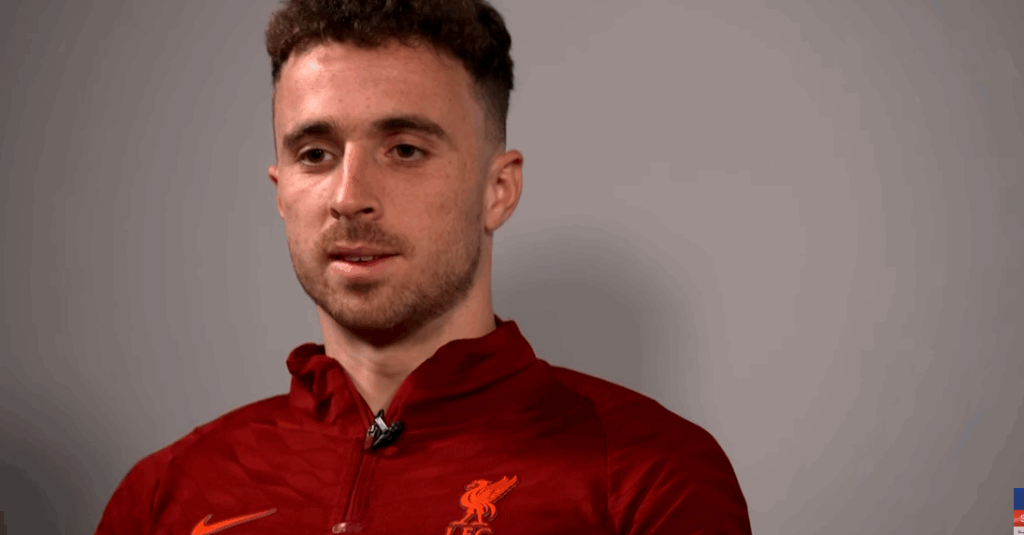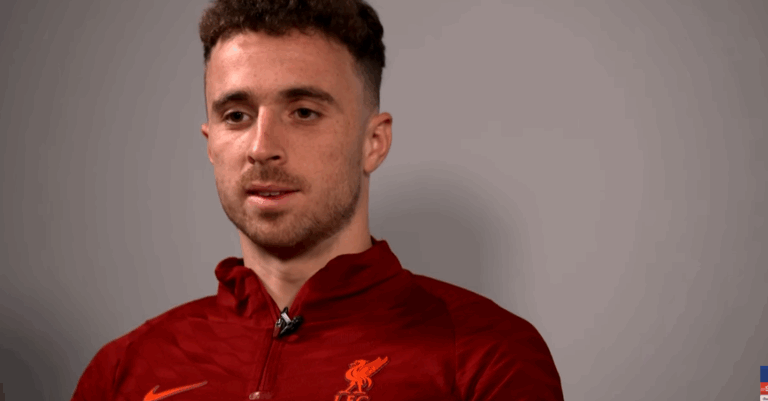Although it doesn’t usually make news in football, Diogo Jota’s height of 1.78 meters (5 feet 10 inches) became a subtly captivating aspect of his journey. Jota wasn’t particularly tall by today’s athletic standards, especially for forwards, but he wasn’t particularly short either. Being just under six feet meant Jota had to stand out in a game that was dominated by tall center-backs and 6’4″ goalkeepers, and he did, spectacularly.
His physique made him extremely adaptable, enabling him to move fluidly into areas that larger players might find difficult to access. He transformed this medium build from a performance ceiling to a creative launching pad. Jota prioritized smart movement, deliberate acceleration, and clinical finishing over outmuscling opponents like Van Dijk or outpacing defenders like Ronaldo.
Jota’s physical appearance never got in the way of his success, from his formative years at Gondomar to his breakout performances at Liverpool. Conversely, he possessed the agility that taller players frequently lack. He excelled at transitional plays while playing for Wolves, frequently tearing through defenses like a silk thread. Jürgen Klopp was drawn to this unrelenting energy, which was fueled by both skill and keen instinct.
Diogo Jota – Bio & Career Table
| Full Name | Diogo José Teixeira da Silva |
|---|---|
| Known As | Diogo Jota |
| Date of Birth | December 4, 1996 |
| Place of Birth | Porto, Portugal |
| Date of Death | July 3, 2025 |
| Height | 1.78 m (5 ft 10 in) |
| Weight | 68 kg |
| Position | Forward, Winger |
| Clubs Played | Paços de Ferreira, Porto, Wolves, Liverpool |
| Total Career Goals (Club) | 102 goals in 302 appearances |
| Portugal National Team Caps | 49 |
| International Goals | 14 |
| Major Trophies | Premier League, FA Cup, EFL Cups, Nations League |
| Link | Wikipedia Profile |

Jota frequently found himself on the receiving end of goals that others missed by using his positional awareness. His flawlessly timed runs and talent for creating space where none seemed to exist more than made up for his lack of presence in the box. His ability to drift wide or drop into midfield to take advantage of weak areas has significantly improved over the years, making him a vital component of Liverpool’s dynamic attack.
Given that both are Portuguese and have played forward, comparisons to Cristiano Ronaldo were unavoidable. However, the disparity in height highlighted a larger idea: football greatness transcends physical size. Jota’s career turned into an example of how tactical adaptability, a strong work ethic, and footballing intelligence can outweigh physical prowess. He demonstrated a level of strategic depth beyond his years with his inventive adaptation to Klopp’s high-pressing style, frequently beginning as a false nine.
The football community as a whole, not just Liverpool and Portuguese supporters, has been grieving Jota’s passing in recent days. His untimely death at the age of 28 due to an automobile accident was shockingly inconsistent with the pace of his successful career. His story ended too soon, just eleven days after his wedding and shortly after he lifted the Premier League trophy. His legacy is still very much alive, though.
Although his height didn’t garner as much attention as his goals, it did capture the essence of the player he was: modest but incredibly influential. Jota was just above average in height, but his work was far from that. With each sprint, press, and subtle turn away from a defender, he disproved preconceptions. Like his predecessor Messi, who was also thought to be too small, Jota showed that greatness frequently comes in measured packages.
Additionally, Diogo Jota was a contemporary symbol for young athletes who don’t fit the conventional definition of the “ideal build.” One particularly useful lesson from his performances was that skill, intelligence, and flexibility frequently outweigh size. Jota was a ray of hope for young forwards from smaller academies around Europe.
Jota was interacting with fans in unexpected ways during the pandemic, a time when a large portion of society was experiencing loneliness and uncertainty. In addition to controlling Premier League backlines, he was also controlling FIFA leaderboards, rising to the top of the global rankings in FIFA 21. He was very well-liked by younger fans because of his dual persona as an elite athlete and a relatable gamer. Jota exemplified a new era of accessible stardom and was exceptionally clear in both his gameplay and self-expression.
He developed a brand that went well beyond the field by working with his eSports team, Luna Galaxy, and frequently broadcasting games online. He was capable of more than just goals and assists. He joined a generation of athletes who knew how to seamlessly integrate sport, technology, and entertainment through strategic engagement.
Outside of the field, Jota kept a refreshingly grounded profile. Prioritizing his role as a father of three, he married Rute Cardoso, his longtime partner. He remained loyal to his family, his country, and his club in an era of ephemeral allegiances and quick celebrity. His passing prompted tributes from cultural leaders and international leaders in addition to teammates and managers, demonstrating how profoundly his presence struck a chord.
The definition of success in elite sports has gradually changed over the last ten years. Scouts no longer only look for height and physical prowess. They seek balance, intelligence, and fluidity. This development was exactly in line with Jota’s career. He personified the shift toward a game that values flexibility over archetype and accuracy over strength.
His retirement, which was prompted by tragedy rather than time, will probably lead to retrospectives that rank him according to his emotional impact and consistency rather than his Ballon d’Or placements. Diogo Jota served as a striking reminder throughout football history that talent can blossom in a variety of ways and frequently in unexpected places.
Even after his passing, the public’s outpouring of grief and the retirement of his number 20 shirt at Liverpool showed how much he meant to those around him. Coaches, teammates, and fans all praised his ambition and humility. Instead of standing taller, he had risen to the top by standing firmly and refusing to be disregarded or undervalued.


